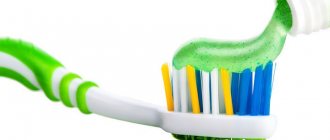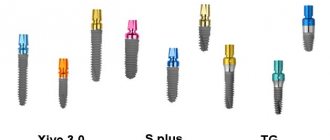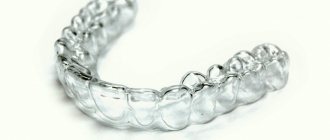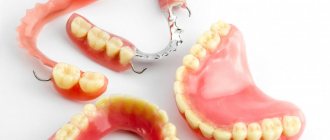Over the course of a month, serious hormonal changes occur in the female body.
General well-being and state of health largely depend on them. During menstrual bleeding, a woman often experiences severe discomfort, so some medical procedures and manipulations are contraindicated for her. Let's figure out whether it is possible to remove a tooth during menstruation? After all, this surgical operation is highly stressful and is not always easily tolerated by patients. At the Line of Smile dental clinic there is no clear policy not to operate on “these days.” But we always try to take into account the cyclical nature of women’s physiology, since surgery during menstruation can negatively affect further wound healing. Therefore, it is important for the client to be honest during the consultation with the doctor and not be embarrassed to ask to reschedule the planned operation. However, if an x-ray shows that there is an infectious focus, removal is carried out on an emergency basis, regardless of what day of the menstrual cycle we are talking about.
Why is it undesirable to have surgery during menstruation?
When planning an extraction, a highly qualified dentist always finds out what stage the woman is in her menstrual cycle. Why is he asking this? It's simple. The quality and composition of the blood directly determines the effectiveness of the anesthesia used and the rate of formation of a blood clot in the socket.
On menstrual days, blood clotting is significantly reduced. That's how it should be. Its composition also changes. Therefore, whenever possible, planned surgical intervention is postponed to “safer” days of the cycle.
Contraindications to the procedure
For some symptoms during the menstrual period, extraction is not done:
- severe abdominal pain, due to which you have to take painkillers;
- nausea;
- low blood pressure;
- heavy periods (heavy bleeding);
- dizziness.
If you feel unwell, surgical intervention will only worsen the problem. The likelihood of complications also increases, and pain after the anesthetic wears off can be excruciating.
Dental diagnoses in which periods are not a hindrance
If you doubt whether it is possible to remove a tooth during menstruation, contact your dentist. If the doctor deems it necessary, he will postpone the operation until later.
Indications for emergency intervention are:
- Severe inflammation, a purulent process that can provoke the development of an abscess, phlegmon, infection of the maxillary sinuses, osteomyelitis.
- A retracted (not fully erupted) wisdom tooth that is completely or partially hidden under the gum tissue/bone. It should be removed as soon as possible if a woman suffers from severe pain, swelling and swelling of the cheek.
- A tooth root fracture resulting from an injury.
- An advanced form of periodontal disease, when it is no longer possible to save the unit.
The specialists at the Line of Smile dental clinic never prescribe removal if it is possible to do without it. They always try to save the diseased tooth and prevent its further loosening and loss. If the roots are in good condition, a pin is installed in them, onto which the crown is fixed on top. Surgery is a last resort.
When you need to treat your teeth even on critical days
The TopSmile aesthetic dentistry clinic has many products for removing teeth in emergency situations, including during menstruation. Before the procedure, the doctor will give medications that will increase blood clotting and conduct computer anesthesia without syringes or injections.
Treatment should not be delayed if the patient:
- purulent inflammation: periodontitis, cyst;
- acute toothache;
- swelling or swelling of the cheek;
- tooth root fracture as a result of trauma;
- acute pulpitis;
- an impacted wisdom tooth that causes pain or swelling.
Note. Particularly dangerous symptoms are fever, bleeding and pus in the gum pockets and mouth. If pus gets inside, the infection will spread through the blood throughout the body, which can lead to the development of sepsis.
What procedures are allowed during menstruation?
There are dental procedures that can be performed without harming your health during menstruation. These include fillings, x-rays, teeth cleaning and whitening. At certain stages of treatment, even prosthetics are allowed.
Installation of a filling. A filling can be placed in a session on any day of the menstrual cycle. The procedure is painless, does not involve excision of tissue, and is sometimes performed without anesthesia. Menstruation does not affect the results. The filling will take root and will not change shape or color.
X-ray. X-rays act locally - on the area of the gum where the diseased tooth is located. The patient's pelvis is protected with a special coating. Due to the fact that the image is taken quickly, the flash of waves is so short-lived that it is not capable of causing harm to the patient. The doctor will perform all procedures in one place - at the dental chair. This means you don't have to move from one office to another to take a photo.
Prosthetics. The procedure can be performed if the orthodontist does not intend to place a pin for the implant. Hormonal imbalance and the production of prostaglandins can cause foreign body rejection. But in this situation, the doctor can prepare or adjust the prostheses for the patient.
This is a completely painless procedure that does not require anesthesia. The possibility of damage to oral tissues is virtually eliminated. The TopSmile clinic uses a gentle Swiss EMS ultrasound system. Thanks to it, it is possible to remove soft plaque, hard deposits and dark stains from the surface of the teeth without the risk of injury and enamel cracks. After polishing with brushes and pastes, the teeth will become smooth and shiny, and a protective layer will form on their surface that will repel new stains.
What are the risks and complications?
Most often, menstruation does not have any effect on the quality of dental procedures. However, the likelihood of certain complications and risks increases. This must be taken into account before deciding to carry out or postpone the operation.
It should be remembered that during menstruation, some women use painkillers. When combined with anesthesia, they can cause unwanted side effects.
Due to the high levels of the hormone prostaglandin in the blood, women feel pain more acutely, and due to blood loss, they experience nausea and weakness. Together, this can lead to fainting and high blood pressure.
Due to a weakened immune system, even the smallest cut can cause infection. As a result, after tooth extraction, the patient will have to treat gum suppuration.
TopSmile Clinic guarantees the safety of patients even on special days. We sterilize instruments in several stages, use premium consumables, half of which are disposable, monitor blood pressure during procedures and take into account all chronic diseases of the patient. We always keep in touch with the patient after surgery. The patient can always call the attending physician, and he will see him at any time of the day.
When to delay deletion
Any planned surgical intervention can be postponed for a couple of days until the menstrual bleeding stops.
So, you can wait if you need to delete:
- dystopic tooth located out of place;
- units that impede the implementation of prosthetics and the installation of orthodontic structures;
- wisdom teeth, which constantly injure the gums and mucous membranes of the oral cavity, cause chronic injuries and inflammation.
Chronic diseases often worsen on the eve of menstruation. This is due to a decrease in immune defense. If a woman knows that after menstruation she needs to go to the dentist and have a tooth removed, she should be especially careful about her health so as not to catch a cold. Otherwise, the procedure will have to be postponed indefinitely.
Why is it better not to treat teeth on critical days?
There are three reasons to postpone visiting the dentist until the end of your menstrual cycle.
1 reason. Blood clotting disorder. On critical days, a woman’s blood vessels dilate. If a tooth is removed during this period, it can lead to heavy bleeding, which only a doctor can stop.
Reason 2. Reduced pain threshold. Before menstruation, the female body produces prostaglandins. These are the hormones that start the process of menstruation. Thanks to them, the uterus contracts, its inner lining peels off and blood is released. Because of these hormones, a woman experiences pain and experiences any unpleasant sensations more intensely.
Reason 3. Risk of inflammation. During menstruation, blood clots more slowly than usual. Therefore, the holes in the oral cavity take several times longer to heal. The immune system is weakened and the body is vulnerable to infections. If a bacteria or virus enters an open wound, gum inflammation will begin.
Note. If on critical days a woman does not experience pain, discomfort and other unpleasant sensations, then dental procedures may not be tolerated. But you need to warn your dentist in any case.
Use of anesthetics
All surgical procedures are performed by Smile Line doctors using highly effective modern anesthetics. This guarantees the absence of pain during tooth extraction and makes the procedure as comfortable as possible.
Usually, when working with the first to fifth teeth, infiltration anesthesia is used. The dentist gives an injection, after which a separate area of the oral cavity “goes numb” and becomes insensitive. If it is necessary to pull out the sixth, seventh or eighth molar, the roots of which are very large and deep, they resort to conduction anesthesia.
Changes in the body
Despite a woman’s feelings during her menstrual period, changes in the body occur even if she does not notice them. These include:
- Opening the cervix
- The synthesis of the hormone estrogen increases, hormonal levels change
- The uterus begins to contract rhythmically
- The inner layer of the uterus is shed and comes out with a small amount of blood
If we talk specifically about dental treatment, the following features may hinder it:
- Weakened immunity increases the risk of infection and inflammation
- Blood clotting is reduced, so there is a risk of bleeding
- Sensitivity and receptivity increases, so the pain threshold may decrease
- Hormonal changes may contribute to the rejection of filling materials
When visiting the dentist, you need to inform him about your critical days.
Many women are not aware of such changes, so they go to the dentist during menstruation, although it is better not to do this.
Precautions after treatment
If the procedure is performed on menstruation, the dental surgeon tells the patient about possible complications and gives detailed instructions on how to behave to avoid them. To minimize the risk of bleeding, you should stop smoking a few days before surgery. This will have a positive effect on blood clotting. Also the day before, you need to exclude coffee-containing drinks from your diet, reduce the intensity of sports training, and avoid hypothermia and overheating of the body.
Immediately after removal, you need to spend about an hour in the clinic so that the doctor can make sure that a dense clot has formed in the hole. It is not recommended to go to work on the day of the procedure. The best option is to go home and rest.
It is extremely important to follow all medical instructions and take prescribed medications. If your body temperature rises, the wound begins to bleed, your health deteriorates sharply, dizziness and nausea appear, you should immediately seek medical help.
There is no need to rinse unless prescribed by your dentist. You should also not touch the hole with your tongue. This can lead to the clot breaking off and opening the wound, causing re-bleeding. In addition, an uncovered hole is a gateway for infection.
Only a doctor can clearly answer the question of whether it is possible to remove a tooth during menstruation. In our dentistry, experienced surgeons perform tooth extraction. We do everything possible to ensure that our patients become healthy as quickly as possible.
In what cases is it better to postpone extraction?
Tooth extraction is a last resort when therapeutic treatment is impossible or does not bring a positive effect. If there is no serious inflammation, then the date of the planned operation can be postponed by several days.
Removal can be delayed for the following indications:
- extensive caries without an inflammatory process;
- dystopic teeth;
- extraction of dental units for further prosthetics.
If the operation has been postponed, then during menstruation you need to protect yourself from colds. Since immunity decreases during this period, you can easily get sick with acute respiratory infections. In case of acute respiratory diseases, removal is not performed, which means you will have to wait for an indefinite period of time.
Carrying out radiography
Radiography is the main tool for diagnostic examination in dentistry. The image reveals all existing internal root defects, the consequences of poor-quality canal filling, and inflammatory elements. Menstruation is not an obstacle to its implementation. Although X-rays are generally considered harmful, radiography is safe for health. The jaw x-ray procedure lasts a fraction of a second and leaves no consequences. This type of diagnosis does not affect the well-being and progress of menstruation.
The peculiarities of the use of ionizing radiation in medicine are such that the harm can only be judged theoretically. In practice, there were no cases of deterioration in health after radiography.
How to relieve toothache at home
If you decide to postpone a visit to the dentist, then you can get rid of a toothache that occurs during your period with any painkillers that are in your medicine cabinet. Before taking, read the instructions and make sure that you have no contraindications.
You can also use folk remedies:
- The most commonly used solution is soda solution . For a glass of warm boiled water you need to take a teaspoon of soda. You can add the same amount of salt. Stir until completely dissolved. Rinse the affected tooth every 2 hours until the pain subsides.
- Decoctions of medicinal herbs also relieve pain well . Chamomile, calendula, sage, St. John's wort are suitable. Pour a tablespoon of herbs into a glass of boiling water and let it brew. When the infusion is warm, strain and use for rinsing.
- Essential oils of fir and cloves will also help in the fight against pain . Soak a small piece of cotton wool and apply it to the sore tooth.
- A decoction of calamus root is also used for rinsing. Mix a tablespoon of root with a glass of water and hold the mixture for several minutes in a water bath, and then let it brew. Strain.
Thus, menstruation is not a direct contraindication for dental treatment, but still, if possible, a visit to the doctor should be postponed, especially if tooth extraction or pin installation is planned.
Periods are so different
A woman’s body begins to prepare thoroughly and in advance for the menstrual cycle. After all, this is not just a condition in which blood flows from the genital organs; a whole series of both physiological and chemical transformations occur.
Many changes occur in the body during menstruation
For those women who cannot even get out of bed during their period, the question of the need to visit the dentist does not arise. The decision about whether such a tooth needs to be removed or treated depends on the characteristics of the body.
You should postpone going to the dentist in the following cases:
- menstruation is accompanied by pain and is discharged profusely;
- on critical days, the woman’s general well-being deteriorates greatly;
- there are diseases in the intimate area.
If menstruation occurs without pain and discomfort, the woman feels well and leads an active life, the situation with the possibility of treatment and tooth extraction looks a little different.
Most women become irritable and whiny
Dental prosthetics
Restoration of the dentition, depending on the degree of destruction, takes from several days to several months. During this period, diagnosis is carried out, elimination of existing inflammations of the oral cavity, strengthening of the gums and periosteum. An impression is made to create crowns of the required shape. When installing bridges, the outer teeth are ground down.
The use of pins or implants in prosthetics is a more labor-intensive and long-term process than the manufacture of conventional fixed and removable structures. Work related to the violation of the integrity of the gums, as well as the implantation of screws into the root trunks or alveoli are stages that are recommended to be postponed until the end of menstruation. Otherwise, reduced blood clotting can provoke the appearance of hematomas in the tissues or massive bleeding. Since events are planned in advance, it is not difficult to calculate the undesirable period in advance and work around it.
If dental surgery is necessary to remove a cracked root, cyst, or previously unrecognized granuloma, the time of its implementation is decided for each case separately. Regardless of menstruation, intervention is carried out when delay poses a greater health risk.
See also: Tampon at night - is it possible to go to bed with a hygiene product?
What can you do when visiting the dentist?
Critical days are not an obstacle to all dental health procedures. You can completely calmly perform hygienic procedures: professional mechanical and ultrasonic cleaning.
Important! On the first day of menstruation, it is better to refuse any type of intervention.
If we talk about treatment, the following are conditionally acceptable:
- Treatment of shallow caries followed by filling
- Teeth whitening and enamel remineralization
- Setting braces
- X-ray of the tooth
During the appointment, the dentist and the patient should discuss all the nuances of treatment and the peculiarities of a woman’s well-being during her period and decide what would be best.











